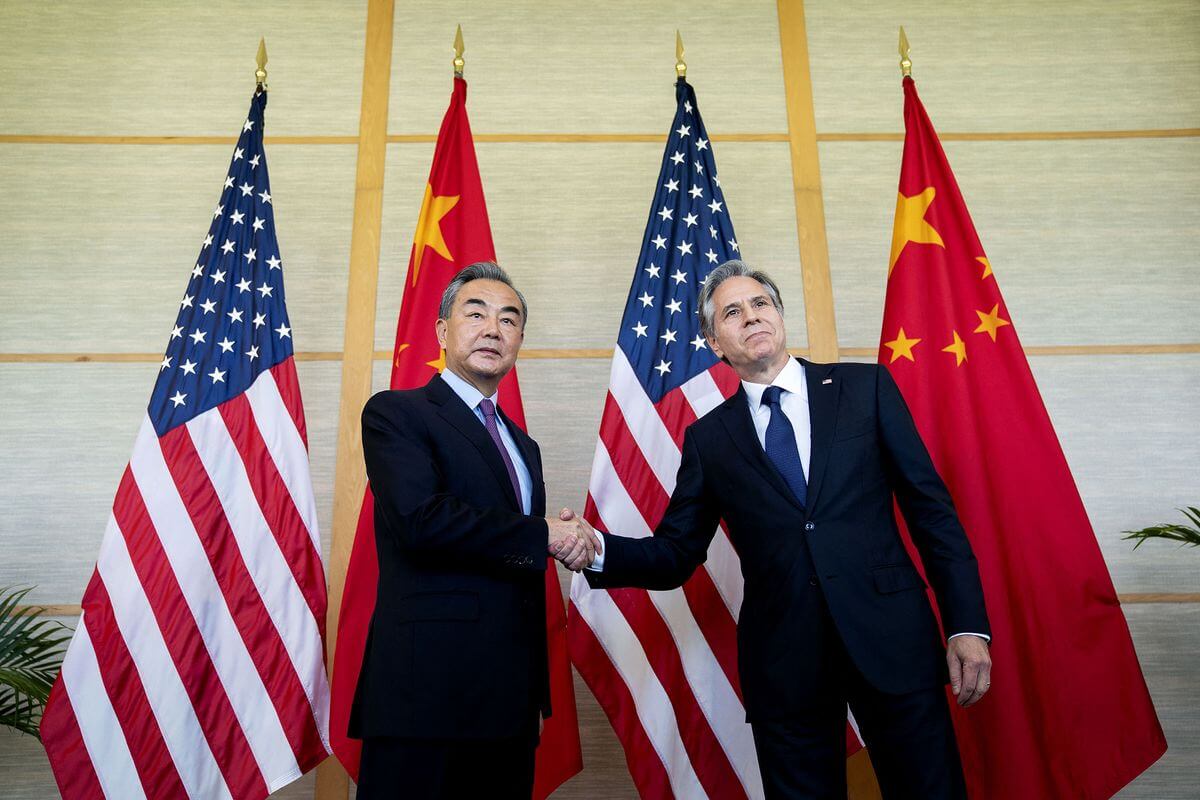After a meeting with Chinese Foreign Minister (FM) Wang Yi on Saturday, the United States (US) Secretary of State Antony Blinken said that Beijing was “echoing Russian propaganda around the world.”
During a news conference on Saturday, Blinken told reporters that he conveyed Washington’s concerns about Beijing’s “alignment with Russia.” Stating that there was a “clear aggressor” and “clear victim” in the Russia-Ukraine war, Blinken said that “it’s hard to be neutral” in the war. “But even if you accept that as a premise, I don’t think that China is, in fact, engaging in a way that suggests neutrality,” Blinken argued.
He slammed Beijing’s continued support for Moscow, accusing the Xi Jinping administration of “standing by” Russia’s “brutal invasion” and “shielding Russia in international organisations.” “It’s echoing Russian propaganda around the world. I believe it’s shirking its responsibility as a P5 member, as I said, and even engaging in joint military exercises,” Blinken said. “Going back even as Russia was massing its forces, President Xi chose to announce the “no limits partnership” with President Putin,” he added.
⚡️Blinken urges China to ‘stand up’ against Russia.
— The Kyiv Independent (@KyivIndependent) July 9, 2022
After a meeting with Chinese Foreign Minister Wang Yi on July 9, U.S. Secretary of State Anthony Blinken called China's claims to be neutral in the war between Russia and Ukraine "implausible," New York Times reports.
“So what I tried to convey to the State Councilor is this really is a moment where we all have to stand up… to condemn the aggression, to demand among things that Russia allow access to food that’s stuck in Ukraine because of its blockade, and of course, that it end the war,” Blinken concluded, calling on China to “uphold” its obligations as a permanent member of the United Nations Security Council.
The top diplomats met in person after the conclusion of the Group of 20 (G20) Foreign Ministers’ Meeting in Bali, Indonesia. In the meeting that lasted for over five hours, the Chinese Foreign Ministry said that the representatives of the world’s biggest superpowers held “comprehensive, in-depth, and candid communication” about their bilateral relations as well as international issues of mutual importance.
According to the press release from the Chinese side, Wang told Blinken that bilateral relations were “still not out of the difficulties caused by the previous US administration” and were in fact facing “the risk of being further led astray from the right direction.” Wang laid the blame for this on Washington’s “misperception of China.”
Chinese Foreign Minister Wang Yi has met with US Secretary of State Antony Blinken on the sidelines of the G20 foreign ministers' meeting in Bali, Indonesia.pic.twitter.com/VIKzIiV8eS
— Zhang Meifang张美芳 (@CGMeifangZhang) July 10, 2022
Wang called on the US to “stop smearing and attacking China’s political system and domestic and foreign policies,” accusing the US of spreading “China-phobia.” “Since the United States has promised not to seek a new Cold War with China, it should abandon the Cold War mentality, refrain from zero-sum game, and stop forming exclusive groupings,” the foreign ministry quoted him as saying.
Despite the two countries’ differences, the ministry said that their conversation “was substantive and constructive, and has helped the two sides increase mutual understanding, reduce misunderstanding and miscalculation, and accumulated conditions for future high-level interactions.”
The US has accused China of supporting Russia’s actions in Ukraine since the onset of its invasion. Last month, a US state department spokesperson slammed China for supporting Russian propaganda on the invasion of Ukraine following a phone call between Chinese President Xi Jinping and his Russian counterpart Vladimir Putin. “Nations that side with Vladimir Putin will inevitably find themselves on the wrong side of history,” the spokesperson asserted, adding that Washington continues to keep a close eye on Beijing’s engagements with Moscow.
FM Wang Yi had a 5h meeting with @SecBlinken. In light of the US call for guardrails for 🇨🇳🇺🇸relations, FM Wang Yi said the 3 Sino-US joint communiqués are the most reliable guardrails. pic.twitter.com/jNqCyodtKJ
— 王鲁彤 Wang Lutong (@WangLutongMFA) July 11, 2022
Blinken also voiced Washington’s “deep concerns” about Beijing’s “increasingly provocative rhetoric and activity toward Taiwan,” “repression of freedom in Hong Kong,” forced labour, the “treatment of ethnic and religious minorities in Tibet,” and the “genocide in Xinjiang.”
China, meanwhile, ‘cautioned’ the US against “sending the wrong signal to Taiwan independence forces” and warned it not to “underestimate the firm resolve of the Chinese people to defend their territorial sovereignty.”
Its foreign policy statement, however, noted that Blinken underscored that the US “does not seek to engage in a new Cold War with China, change China’s system, challenge the status of the Communist Party of China or block China, and it does not support Taiwan independence or seek to change the status quo across the Taiwan Strait.”
Both sides agreed that the dialogue was substantive and constructive, and has helped the two sides increase mutual understanding, reduce misunderstanding and miscalculation, and accumulated conditions for future high-level interactions.
— 刘晓明Liu Xiaoming (@AmbLiuXiaoMing) July 10, 2022
🇨🇳 🇺🇸
The pair also discussed the removal of tariffs on Chinese imports, a drastic policy change being considered by US President Joe Biden. However, in a press briefing one day before Blinken and Wang’s meeting, White House Press Secretary Karine Jean-Pierre said no decision has been made on the matter just yet.
Furthermore, they spoke of avenues for cooperation in climate action, food security, global health, and counternarcotics.

